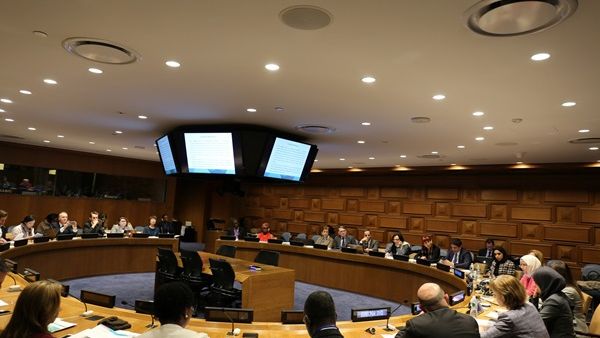Doha International family institute hosts panel discussion at united nations session

In partnership with the Permanent Mission of the State of Qatar to the United Nations (UN), Doha International Family Institute (DIFI), a member of Qatar Foundation for Education, Science and Community Development (QF), organised a panel discussion during the 54th session of the UN Commission for Social Development (CSocD 54).
The panel, which took place on 9th February 2016, was held under the wider theme of ‘Work-Family Balance, Social Development and the 2030 Agenda for Sustainable Development Goals: Implementation of Culturally Specific Policies’. DIFI’s participation in the event showcased QF’s on-going mission of fostering a progressive society that prioritises family and social development.
The panel consisted of six participants, which included five panellists and one moderator, and featured representatives from the United Nations and non-governmental organisations. The session was moderated by Ms Lara Hussein, Director of Family Policy at DIFI, and HE Sheikha Alya Bint Ahmed Bin Saif Al Thani, Permanent Representative of the State of Qatar to the United Nations, delivered the opening remarks and called for enhancing the role of the family in the implementation process of the 2030 development agenda.
Ms Noor Al-Malki Al-Jehani, Executive Director of DIFI, presented on ‘Re-thinking Work and Family Policies within the 2030 Agenda for Sustainable Development Goals: Highlights from the Arab Region’, while Dr Bahira Sherif Trask, Professor & Chair Human Development & Family Studies at the University of Delaware, spoke about ‘Work-Family Balance, Social Development, and the United Nations 2030 Agenda: The Recognition, Need, and Implementation of Culturally Specific Policies’.
Additionally, Mrs Renata Kaczmarska, Focal Point on the Family, Division for Social Policy and Development, UN Department of Economic and Social Affairs (UNDESA), discussed ‘Socio-economic Policies Recognising the Value of Unpaid Work’. The session was then concluded by Mr Ignacio Socias, Director of Communications and International Relations at the International Federation for Family Development (IFFD), who presented on ‘The Role of Fathers and Employers in the Implementation of Effective Work-Family Balance Policies’.
The panel had four main objectives. These included: to engage in a substantive dialogue on policy options to further implement internationally agreed sustainable development goals contained in the 2030 agenda; to discuss work and family policies also contained within the framework of the 2030 agenda; to emphasise that context is a primary determinant of how well work-family balance can be encouraged and supported from a policy perspective; and to highlight and discuss innovative international policies and strategies that promote work-family balance.
Background Information
Qatar Foundation
Qatar Foundation (QF) is a non-profit organization made up of more than 50 entities working in education, research, and community development.
Our unique ecosystem—supported by partnerships with leading international institutions—is built on initiatives that address our most pressing challenges, create global opportunities, and empower people to shape our present and future.






